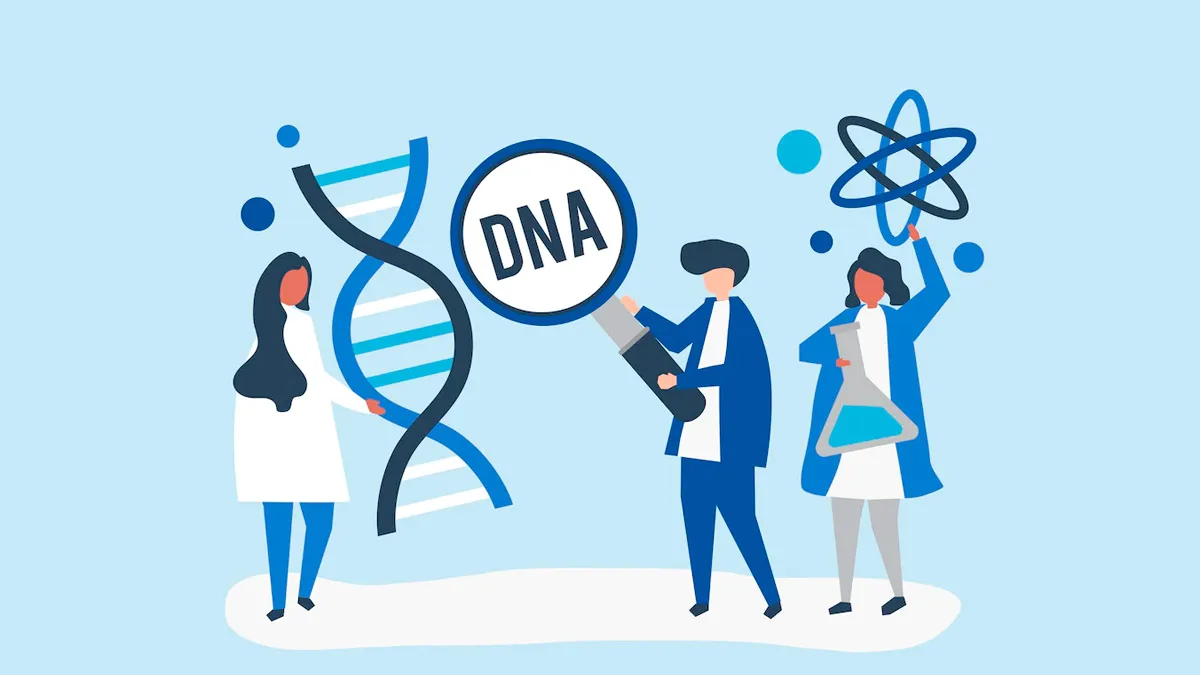
For generations, murmurs have run through households: "It's in the family." From the subtle sufferings of depression to the deep-seated mysteries of schizophrenia, mental illnesses tend to seem to cut in families. But how much of this is really "in our DNA," and how much is influenced by our world?
Table of Content:-
CHECK YOUR
MENTAL HEALTH

In an exclusive interaction with the editorial team of Onlymyhealth, our expert, Dr Nikhil Nayar, a Psychiatrist at Sharda Hospital - Noida explained that the answer, as with the majority of things in health, is multifaceted and intriguing. “While the concept of a ‘mental illness gene’ is a popular myth, scientific studies continue to affirm that genetics are a major, but not sole, factor in causing mental illnesses,” he highlighted. Here is everything he shared with us.
Heritability Factor: More Than Just a Coincidence
Familial, twin, and adopted studies have repeatedly demonstrated that numerous psychiatric conditions have a high "heritability." What this implies is that there is a component of the risk variation for developing these conditions that can be explained by genetic variation. For example, the heritability of such conditions as schizophrenia, bipolar disorder, and autism is very high, frequently 80% or higher, and higher than for many famous physical diseases. Even such widespread conditions as major depression and anxiety disorders demonstrate an evident genetic factor, though usually less marked than for serious mental illnesses.
If you have a close family member, a parent, sibling, or child, who has a mental disorder, your risk of developing the same condition can be much greater. For instance, first-degree relatives of people with bipolar disorder or schizophrenia are at a 6-10 times increased risk compared to the population as a whole. This clustering within families is a strong indication of genetic effect.
Also Read: Tech Neck To Texting Thumb: Expert Answers If Your Gadgets Are Harming Your Bones

Beyond a Single Gene
“It's important to realise that mental health disorders are seldom, if ever, a result of one defective gene. Rather, they are polygenic, and they result from the intricate interaction of thousands of genetic variations, each of which contributes a modest amount to the overall risk,” Dr Nayyar stated.
Large-scale genetic research has now started to identify certain "hot spots" in our genome that are linked with various psychiatric disorders. Most interesting is the finding of common genetic threads running through apparently different conditions. This "pleiotropy" indicates that certain genetic variants could have multiple effects on brain development stages and contribute to the risk of multiple mental health diseases at the same time.
Critical Contribution of Environment
While genetics preloads the gun, it's frequently the environment that fires it. The "nature vs. nurture" controversy is now largely an unfounded dichotomy in mental health. Rather, scientists underscore gene-environment interaction, a dynamic process by which an individual's genetic predispositions are activated differently based on his or her life experiences and environment.
Environmental exposures in this context are defined broadly to include everything from biological exposures to psychosocial stressors. These may include:

Prenatal exposures: Prenatal exposure to toxins, infection, or stress.
Early life experiences: Childhood trauma, abuse, neglect, or chronic stress can have a significant impact on brain development and gene expression.
Social and cultural exposures: Poverty, discrimination, loss of social support, and even extreme weather may be contributing factors in mental health issues.
Lifestyle decisions: Drug use, unhealthy eating, and sleep deprivation can also affect mental health and interact with genetic susceptibility.
The study of epigenetics also sheds greater light on this delicate dance of genes and environment. Epigenetic processes are in the position of dimmer switches for our genes; they do not alter the DNA sequence itself but can switch genes "on" or "off" in accordance with environmental changes. This is to say that stress in early life, say, can cause lasting epigenetic changes that shift gene expression and increase one's lifelong risk for mental illness.
What Does This Mean for You?
Learning about the genetic aspect of mental health is not predicting a predestined future, but is about strengthening individuals and families with information. If there is mental illness in your family, it's a useful part of your health puzzle. Ask your relatives and learn as much as you can about their mental health history. Secondly, being aware of a possible genetic risk can motivate proactive behavior. This could involve getting an early referral to a mental health professional, learning ways to cope, and putting protective factors first, such as a healthy lifestyle and good social relationships.
Bottomline
The path to understanding the intricate weave of mental health continues. As genetics lay the groundwork with an initial plan, our life experience and environment constantly engage that plan, molding us and our minds. By recognising both the significant role of our genes and the substantial role of our experiences, we can progress toward a more balanced and successful model of mental well-being for everyone.
Also watch this video
How we keep this article up to date:
We work with experts and keep a close eye on the latest in health and wellness. Whenever there is a new research or helpful information, we update our articles with accurate and useful advice.
Current Version